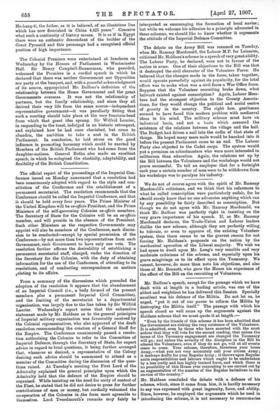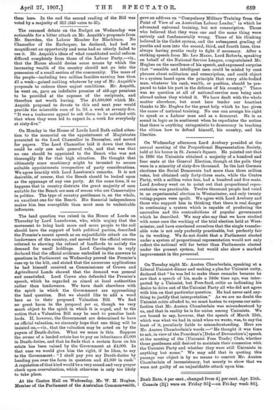Mr. Balfour's speech, except for the passage which we have
dealt with at length in a leading article, was one of the ablest and weightiest be has delivered this Session. Specially excellent was his defence of the Militia. Do not let us, be urged, "put it out of our power to reform the Militia by
destroying the Militia itself." The passage with which his speech closed so well sums up the arguments against the Haldane scheme that we must quote it at length Even by the friends of this scheme it has been admitted that the Government are risking the very existence of the Volunteers. It is admitted, even by those who have asserted with the most ardour that they will vote for the second reading, that unless the terms of the Yeomanry engagement are changed the Yeomanry will go ; and unless the severity of the discipline in the Bill be altered the Volunteers, even if they do not go, will at all events cease to come. Your scheme, therefore, threatens your home Army,—what you not very accurately call your citizen Army ; it destroys drafts for your Regular Army ; it throws upon Regular units responsibilities and labours which ought to be undertaken by a less costly and less highly trained force, and which there is no possibility of this House ever consenting to see carried out by an augmentation of the number of the Regular battalions in the service of the country."
Mr. Haldane concluded the debate with a defence of his scheme, which, since it came from him, it is hardly necessary to say was expressed with great ingenuity, force, and ability. Since, however, he employed the arguments which he used in introducing the scheme, it is not necessary to resummarise
them here. In the end the second reading of the Bill was voted by a majority of 312 (343 voter to 31).



























































 Previous page
Previous page